#the thing is all 3 have kids
Explore tagged Tumblr posts
Text
Season 8, episode 4 - Eddie confronted a (seemingly divorced) dad about not being there for his son despite having the opportunity to do so when HE is in a position where he wants to be with his son despite not having the opportunity (or so he believes)
Season 8, Episode 5 - Eddie is on call helping a divorced dad get his head out from being stuck in a pumpkin, which he did to try and recapture the magic of Halloween when his girls were little because he 'doesn't get them for the holidays', AFTER Eddie talks about Chris now being too old for trick or treating/Halloween and how he feels he is missing Chris grow up (permanently the way he talked about it felt like he thought Chris was never coming back tbh)...
Season 8, Episode 6 - Eddie will be there to help get a kid freed after getting stuck in a pipe while also being around the kid's parents who are about to begin getting divorced for ???
There's subtext, there's text, and then there's GLARING text
#9-1-1 on abc#911 abc#911 on abc#eddie diaz#season 8 the season of eddie#i do think we are finding out the dad who is getting the divorce in ep 6 is gay and by think i mean praying#and yes the ep 5 dad can also apply to the problems hen and chimney were facing too#that was the obvious comparison#the thing is all 3 have kids#so if it applies to hen and chimney in the immediate short term problem#it applies to eddie in the long term#especially if we reference the convo about chris while they were decorating#gay eddie diaz#we are closer than ever to getting you out of the closet
13 notes
·
View notes
Text
Also increasingly aware that a LOT of people "manage" getting through the 40+ hour work week by sleeping less than is healthy and relying on stimulants like coffee and energy drinks to keep them going.
For people who are unwilling or unable to do this...work really does just dominate your life. Like we really should not have to rely on unhealthy practices just to have a social life or keep on top of housework or whatever.
I know I post about this a lot but I'm so TIRED all the time and it's just so depressing that this is how we're expected to spend the one life we have.
#i have to get at least 8 hours of sleep a night to even barely function#with sleep#getting ready for work#commute#cooking#and errands#I typically have maybe 2-3 hours to actually do what i want in a day#and I'm usually too tired to actually do the things i want to do#and that's with a very short commute#if i actually had a long commute I'd basically do nothing but work#i see my friends like once every few weeks or months#because we're all so fucking busy with work and have such little time for socialising#and none of us even have kids or anything!!
27K notes
·
View notes
Text




pt 1 of some much requested cyra lore
#bg3#baldur's gate 3#tav#morgueweave#tw parental abuse#please take care i know this sort of thing hits for some people#i wrote this way too long and it's about as subtle as a punch in the face so i had to break it into pieces#teenage cyra is kind of an icon but also ouch ouch ouch#you can tell her egg donor is evil bc she doesn't have any eye shinies#madame with all due respect if you don't want your kid to call you out maybe don't have an affair#also i feel like cyra with no braids/glasses in an outfit that isn't black or brown is some kind of cursed. she shouldn't exist like this
2K notes
·
View notes
Text
Ideology of Exceptionalism and Gravity Falls; meta and character analysis

I had a whole ago read a post by @icanlife that had a quote by Alex Hirsch on Ford's greatest flaw, and wanted to explore what the flaw is, which is the ideology of exceptionalism; in the exploration, I’ll touch on what it is and how it is used in abusive relationships and cults, as well as how it drives multiple Gravity Falls characters and consequently how it impacts relationships between these characters, and how the show ultimately refutes exceptionalism.
Quick note here; I am not in any way, shape or form a psychologist nor have any formal training in psychology; this is written from my own experiences with this ideology and my own forays into psychology and trauma-informed learning. It is also written with a loose understanding that is likely not broad enough to cover all references to cults, extremist groups and abusive relationships.
The Ideology of Exceptionalism
First of all, we have to get through a drier bit, which is… what is the ideology of exceptionalism and how does it arise? Might be fairly obvious, but it is the belief that you are, or belong to, a group of exceptional people, thus more important and worth more than anyone else; ie, those who don't qualify as 'exceptional'. It is often a subconsciously learned ideology. Now, what qualifies one as exceptional can be extremely varied; generally it revolves around something that provides some form of privilege. Thus, it might be, as the main exceptionalist idea in Gravity Falls, 'intelligence', or power, or it can be such things as attractiveness, quantity of money one has, species, nationality, or skin colour and ancestral heritage. The ideology of exceptionalism, being by nature hierarchical, devalues, and at its worst, openly and violently dehumanizes those who do not qualify as exceptional.
For why exceptionalism occurs is an extremely broad topic, but I've personally found that, for exceptionalism revolving around intelligence, it's a result of a poor sense of self-worth, and having one's self-worth tied to what makes one exceptional. Poor self-worth itself (again, broadly) is a result of childhood trauma from a lack of positive affirmation and unfulfillment of the emotional needs of the child. Meanwhile, self-worth becoming tied to the quality of exceptionalism generally is a result of when positive affirmation was pretty much solely provided around their 'exceptionalism', especially when provided derogatory commentary, or a blatant example of how they would be treated if they aren't 'exceptional'. As a result of the general lack of affirmation, self-worth then becomes often solely reliant on the qualities of exceptionalism, as that is the only way for the child (and later, adult) to get affirmation of their worth, as well as out of fear of being ‘not worth anything’ like the examples of ‘non-exceptional’ people they have been given.
This is especially likely to occur when the child is a social outcast; the adoption of the hierarchical ideology of exceptionalism, and the devaluation/dehumanization of others often occurs subconsciously as an avoidance/minimization tactic from pain. This is to say, the child, and later the adult (if healthy self-worth is not established) goes 'it doesn't matter what the non-exceptional people say or if they accept me since I matter more than them because of my exceptionality'. It can even be taken further, that being shunned is part of one's exceptionalism, and becomes part of the qualifier of being exceptional. For instance, 'they just can't understand because they aren't exceptional and that's just a part of being exceptional'. This idea also neatly tailors into the part of the concept of being better then others means you are separate from others; this can be taken that someone who is special, needs to be alone to be truly special.
Obviously, exceptionalism is not a healthy coping mechanism for poor self-worth, as often such people constantly feel the need to prove and show off their exceptionalism to gain that affirmation and avoid rejection, which is stressful. As well, it often negatively impacts their relationships with other people as a result of the arrogance of believing that they are better than most others, or even deliberate sabotage due to their arrogance. This occurs as they flatten the complexity of human experience to black-and-white hierarchical categories of exceptional/not-exceptional through constant judgement of those they meet, and often refuse to engage with people who don't belong to their 'exceptionality', or even people they simply don't like, even if they technically qualify. Generally, those that they do like or have close relationships with, often due to being similar, are automatically labelled as 'exceptional'. Those judged as ‘exceptional’ also become privy to the open judgements of ‘non-exceptional’ others, out of a subconscious belief by the exceptionalist that the other believes similarly; something that may strain their relationship if the other doesn’t ascribe to exceptionalism. This all culminates in the exceptionalist being blind or even adverse to the diversity of experiences, which makes it difficult to create relationships and community outside of echo chambers of their own beliefs (if they can even find this), and subsequently, these people are often isolated and have very few to no close relationships with people.
However, all humans require connections with other people, relationships where one can rely on others emotionally and physically if needed and feel accepted; they also require to feel like they are worth something, that their life has meaning. Lacking meaningful connections and having a crippled sense of self-worth, a deep yearning hole is left in these people. Exceptionalism, especially as it is a narrative constantly pushed by Western society as it validates hierarchies, is then employed as a (often subconscious) trauma response to assuage this yearning hole, with arrogance and denial. And depending on the circumstances, it can be a very strong and definitive trauma response for people.
This isolation and lack of self-worth is catnip to abusive relationships, including cults and extremist groups. These types of relationships often heavily rely on isolating their victims or pulling them into echo chambers of solely the abuser’s rhetoric, to redefine what is healthy through gaslighting; as the exceptionalists are already isolated, this makes them extremely susceptible. They also often provide these people affirmation, and in these cases especially about their exceptionalism, thus confirming their self-worth, their 'specialness', while also providing them the connection they have been lacking, either through the cult community or through the abuser’s own presence. These emotional needs, which haven’t been met in a long time, if ever, begin to be fulfilled; something that abusive relationships and cults hinge on, rather than any form of logic.
Ideology of Exceptionalism and Gravity Falls
The main characters within Gravity Falls which are heavily ascribed to exceptionalism would be both Ford and Bill; this characterization deeply impacts the story and their relationships with others (technically the Northwest are another case regarding wealth, but less directly impact the storyline and thus tangential; Gideon also is an example, but as a mirror of Bill). With each of these characters I’ll go into detail within their sections on the way they began to ascribe to exceptionalism, and how it plays out later in their relationships; I will first begin with Ford, then move to Bill. Then, to cap it off, I’ll go into the characterization of Stan and the way Gravity Falls refutes exceptionalism.
Ford and Exceptionalism
Firstly, the quote from Alex Hirsch that kicked this whole baby off, as mentioned previously;
“Ford sees Dipper as someone who’s special like himself. That’s Ford’s great flaw, his arrogance is he believes that there’s special people, and everyone else. That human attachments are actually weaknesses. And the song and dance that he’s giving Dipper right now, is the song and dance that he gave McGucket, back when they were younger… ‘You and me are different, we’re better than everyone else. We have a path that no one else can understand, and only us can do this.’ It’s a very seductive idea for Dipper… Dipper is a smart kid, but Ford’s projecting. Ford loves Dipper because he sees someone who’ll tell him ‘yes’ to everything. Who’ll never challenge him, who’ll do a really insane dangerous mission.”
Very blatantly Alex Hirsch calls Ford out on his arrogance in the belief that he is special, in his belief in the 'lone hero' complex, in his belief in exceptionalism. And really, it should be no surprise that Ford does so, considering the way he's depicted as a social outcast as a child (other than Stan), and the way his parents have been clearly shown to be not particularly emotionally supportive (“I’m not impressed”); they don't provide positive affirmation except for his intelligence (mostly due to the possibility of money making through it…), while also actively comparing him to Stan who is derogatorily ‘not-exceptional’, and ‘worth less’. This all sets Ford’s self-worth up to be fragile, and other than Stan who wholeheartedly accepts him, he is isolated and invalidated; plus, the only other validation he receives is around his intelligence. All very classically fitting the profile for exceptionalism.

Image id: Stand and Ford when they were children, both clearly enjoying each other's company.
Ford’s belief in his exceptionalism catalyzes after the shattering of his and Stan’s relationship. Previously the twins are shown to do everything together, having a very close caring relationship; something unlikely if Ford thought he was better than Stan. Also, when Ford is talked to about his opportunities, Ford looks uncomfortable at the way they talk about Stan as inferior, compared to how he himself is being praised; but in the offer he’s simultaneously finally being validated, he’s being told he’s someone worth something, and he’s going to be someone worth something after this. And then the science fair incident occurs, and Ford loses that validation from his parents, from the judges and a future of more validation; after being promised validation and acceptance, it slips through his fingers. And in his anger of being denied that, it becomes easy to begin to slip subconsciously into the rhetoric the others have been feeding him; that he’s exceptional, that Stan isn’t, and he deserved to be recognized for his worth. So he breaks the relationship with the only person who accepted and validated him for who he is. With that loss of previous support, Ford becomes then deeply obsessed with proving his exceptionalism to the world to assuage that fragile self-worth, to become accepted, or even better, revered, confirming that he is someone of worth, someone special, like he was promised.
Ford’s obsession also doubly functions as a way to alleviate his guilt over shattering their relationship; if he’s exceptional as he believes, then he’s within the right to respond the way he did, as he’s worth more than Stan, he's better off alone, and he has a right to be angry over being denied that validation. As well, in much the same way as it is used as a way to alleviate his guilt over the end of their relationship, it is also likely used in a way to minimize the pain of being ostracized (although not directly depicted); afterall, Ford’s keenly aware and insecure about his social ineptitude and his six fingers as things that make him different from other people, case in point with his experience visiting Lazy Susans Diner. Thus it wouldn’t be unsurprising if he uses the idea of being worth more than those who ostracize him to imply it ‘doesn’t matter’ what they think. His ostracization by nature keeps him from generally forming close relationships, with the exception of Fiddleford (who much like him, is socially outcast, and intelligent) during his university days. As a result, he's isolated and acutely lonely, having lost Stan.

Image id: One of the missing Journal 3 pages in TBOB, detailing Ford's botched social interaction in Lazy Susans Diner. In the background is the print of his six-fingered hand.
In his obsession over being acknowledged, Ford, like many others who believe in exceptionalism, identifies strongly with the causes of his ostracization (his intelligence, his six-fingeredness) as part of, or wholly, makes him exceptional. It is obvious through his choice of study; with the grant he has been gifted, he chooses to revolve his work around the weird, the outcast, something that you see Ford gravitate towards being an outcast and deemed 'weird' himself (which in Journal 3 he openly talks about). Something that can be, much like him, framed as 'exceptional'. His work is even recorded in a journal that Ford deliberately chooses to put his six-fingered hand on the cover of. Intertwined with the way it becomes adopted into the idea of exceptionalism, is the keen loneliness from his ostracization and a deep desire to be accepted and a wish to find a community of other weird people.

Image id: Two pages from journal 3, labelled 'Myself', in which Ford is open about being weird, and a social outcast, while also noting his ambitions and that 'Gravity Falls, [is] the place that I fit in.'
Ford and Bill
All of this culminates in Ford becoming an incredibly easy target to manipulate by Bill. He’s desperate to be acknowledged (and thus accepted) by an authority figure so that his belief in exceptionalism is justified and his self-worth confirmed. And he knows he’s intelligent, that he's exceptional because people have told him so, but he just needs to prove it with something that shakes the world. And the grant is finally his second chance after the fair, but he's stuck, and the research is going nowhere, and he's in a town where he doesn't really know anyone and he’s so terribly lonely. And sure, he clings to his exceptionalism but if he can't even prove it then is he really exceptional? Is he even worth anything like he thought he was? And what about what he's left behind, rejected, because of his exceptionalism?
And THEN he finds an incantation and he ignores the warnings because maybe, just maybe, this will be his break to get that acceptance/validation he has been chasing his whole life?
And then it's better than that.
A god, essentially, shows himself to him, an ultimate figure of authority. And he tells him that yes, he is special, he’s worth more than other people, and Bill’s only showing himself to Ford because he is so much more intelligent than anyone else. Ford is suddenly getting his exceptionalism confirmed by a god of ancient knowledge, an immensely intelligent interdimensional being, and he’s also showering him with affirmations, specifically affirmations around what Ford's fragile self-worth is based on. And even better, he's delighted by Ford's six-fingeredness; he's not put off at all, it even becomes his main nickname for Ford, just like it used to be for Stan all those years ago. On top of it all, Ford's own social ineptitude doesn't phase Bill, another thing Ford is self-conscious about; Bill's own social ineptitude as he's not human probably makes Ford feel comfortable, knowing that's not expected from him.
Through Bill, not only does Ford find someone who validates his self-worth through intelligence and even confirms to him that his weirdness is part and parcel of making him special, he also finds someone who he regularly (generally) is in contact with, who enjoys talking to him and even banters with him familiarly. Hell, Bill even deliberately goes out of his way (literally possessing a whole wack ton of rats, then dream karaoke) to celebrate his birthday with him; how long do you think Ford has simply skipped his birthday since he had no one to really celebrate it with? The loneliness, beneath his arrogance and belief in exceptionalism, is being fulfilled; for the first time since Ford was a teenager, he's fully accepted by someone, social awkwardness, six fingers, exceptionalism and all.

Image id: One of the lost pages from Journal 3 in TBOB, the 'one thing led to another' page, with Bill and Ford singing karaoke and drinking together, both clearly enjoying themselves; Bill has an arm slung around Ford's shoulders.
So it's really no surprise at all that Ford fell for this, hook line and sinker. Hell, if I was in Ford's shoes I would fall for it just as hard. And I've seen a few posts floating around talking about how Bill is bad at manipulating, and no, he's not. He was able to pinpoint exactly what Ford wanted and needed, and provided that, was charismatic enough to provide that. Again, manipulation isn't about logic. It really isn't; it's about the emotional core in people, what people lack and what you can give them to slowly reel them in to sing your dance and song. And people will ignore vast swaths of red flags when you're finally being accepted, when you're finally getting your emotional needs met at least in some way or form. It's better than not having them met at all, such as previously. So Ford worshipping Bill is really not a surprise, especially as Bill deliberately stoked it.
All of this is part of why you see Alex Hirsch call Ford's belief in his exceptionalism his greatest flaw; because it allowed him to be very easily manipulated by Bill, and by its nature kept Ford isolated from others, evident by his arrogance in assuming he knows best and refusing to see other people who aren't as 'intelligent/weird' as him as worth getting to know, listen too and even reach out to ask help from, it's him believing he has to be the lone hero as someone whose 'special'. It's something that blinds him to the danger of his work around the weirdness of gravity falls because he’s desperate to seek a place where he and his weirdness belong, and it's something that plays out in each and every relationship he has because it's something he clings to so deeply. It's what cost him his relationship with Stan, who previously accepted him completely, and, as he's disinclined to form new relationships and as Bill actively strokes his paranoia (Trust No One…), ultimately further increases the hold Bill has over him. It's only Fiddleford’s presence as he works with Ford that allows him some form of outside reference and reprieve from solely Bill’s influence, something that Bill resents deeply and is clearly jealous and angry about, even if Fiddleford is helping create the portal. And it's ultimately Fiddleford, once he was aware enough of what was happening, calls Ford out on it, seriously jeopardizing Bill's influence over Ford; but Ford is too invested in the portal, in chasing his own ambition and caught up in Bill’s manipulation to take him seriously, until the incident with the trial, and Ford beginning to hear other voices then Bill.
Ford’s Exceptionalism and Wider Relationships
Now back to how it plays out in all Ford's relationships; we've already gone over it with Bill's influence, because it made him extremely easy to manipulate, and with his disregard of Stan in favor of validation of his exceptionalism. But Ford, as pointed out by Alex Hirsch, also exerts the ideology's seductive rhetoric to both Fiddleford and Dipper (who look up to Ford) in a similar way that Bill does with him (although there is a difference of it being used intentionally and maliciously, compared to subconsciously and earnestly, even if it is problematic). Ford, with his black-and-white view of exceptionalism, sees both Fiddleford and Dipper as people who are like him; 'exceptional', and so he treats them as such, and uses this rhetoric to coerce them into helping him.
For Fiddleford, the lure is how he can change the world, how he can be finally acknowledged if he helps Ford with the portal. And it works well; he willingly chooses to leave his own work and his wife and young son, to work with Ford. Much like Ford, Fiddleford himself is also a social outcast and regularly presumed less smart than he is, and he’s got a chip on his shoulder to prove himself, to gain acknowledgement and recognition from the world at large. Although Fiddleford has a family which presumes he’s not entirely lonely like Ford is, he also clearly has deep feelings for Ford, some which are hinted to be more than just ‘friendly’ feelings; it is likely the combination of the lure of validation and spending time with Ford, a kindred spirit that accepts him and an old friend/crush, that causes him to agree (afterall, it was Ford who made Fiddleford feel accepted and choose to stay at Backupsmore). And Fiddleford’s not even considered a partner, but rather an assistant to Ford due to Ford's arrogance, and he still drops everything to go! It’s more about their relationship and connection rather than validation, but that doesn’t stop Ford from espousing exceptionalism. And this is a distinguishing difference, because although Fiddleford would like recognition, he’s not there solely because of it; he’s not a believer in exceptionalism nor arrogant about his skills, and so, unlike Ford who is blinded by his obsession, he’s much more aware of the dangers of the weirdness of Gravity Falls. Thus, he's actively calculating the risks involved, and when he realizes there could be potentially devastating consequences of the portal, he attempts to talk Ford out of it; this fails due to Ford’s own denial and obsession over the portal. In the end, it all goes terribly sideways, and Fiddleford ends up losing everything he had; his wife, his son, his friend, his memories and himself to the trauma he had experienced at the invitation of his friend with the lure of validation and company, due to the memory gun he had created himself.
As for Dipper, much like Ford, he also has issues with self-worth (many of the episodes deal with Dipper finding self-worth; ie, the manotaur episode), has a physical oddity (his birthmark) and by far the trait he relies on most for worth is his intelligence (for example, in one episode he rubs it into Mabel's face over and over again in beating her in games). He's also extremely desperate to be recognized by authority figures as someone intelligent, case in point when he summons the dead after being made fun of by the government agents to try and show them that the information he's gathered is important after Stan dismisses his knowledge. This desperation to be seen as someone of worth from Dipper, much like Ford, extends to the need to be a hero, something he even says at the end of the zombie episode; yet, due to Mabel, unlike Ford he's not a lone hero, and Mabel also half the time acts as the hero.

Image id: Zombies crawling out of a crack after Dipper summons them; Dipper and the two agents look on in horror.
It all culminates in Dipper hero-worshipping Ford when he returns; really, no different than Ford worshipping Bill. And Ford clearly finds it extremely flattering; Dipper's attention and amazement of him feeds his exceptionalism. Exactly how Ford responded to Bill, Dipper is willing to do anything for Ford, excited too, in an attempt to impress Ford and be validated and accepted. And for Ford, that's an extremely heady feeling, especially as someone who has been constantly alone the last 30 years, especially when he had one previously confirm his exceptionalism all those years ago and stopped, and now someone is once again affirming that idea. And Ford doesn't have to be alone again, because he's found a kindred spirit in Dipper as his assistant, someone ‘just’ like him, someone who is exceptional. Because he sees himself in Dipper, he begins to espouse exceptionalism unconsciously, by praising Dipper's own intellect and adventurous spirit, assuaging his feeling of self-worth, while also telling him he's more important or better than others because of it.
And it's seductive to Dipper, because he wants to hear those affirmations of his self-worth, especially as he hero-worships him, but Dipper isn't sold on it, because it means leaving Mabel behind, it means believing that he's worth more than Mabel (and also, Stan, and all his friends he’s made in Gravity Falls). It's ultimately because of his relationship with Mabel that he rejects the ideology; he's not isolated the way Ford was with Bill, and he's not willing to break that relationship for that acknowledgement, because his relationships matter more to him.
Bill and Exceptionalism
Now of course, that's only on the Pines; what about Bill?
While it's obvious that Bill uses exceptionalism as a main manipulative tactic, it's not just an ideology he sprouts emptily; it's also an ideology he believes in, just like Ford, although it's less based on intellectual exceptionalism, and more on power and 'weirdness'.
This most distinctly can be seen in Bill's denial about what happened to his home dimension; Bill's belief in his exceptionalism occurs as a pain avoidance tactic from killing his whole dimension. Bill was clearly a social outcast within his dimension due to being able to see 3d; he's not accepted, and not trusted, to the point that there is medical intervention to make him blind. That's a deeply traumatic experience that completely erases one sense of self-worth, where one’s sanity is called into question by your parents on something that is not harmful, that's beautiful and you just want to share with them. It's a deep and clear rejection of who Bill is, and his ability. As a result, out of a desperate bid to be understood and accepted, he ends up trying to show them the stars. And it ends up killing everyone.

Image id: Page of TBOB, on 'The Early Years' which notes that Bill was an oddity for seeing 3d, something that was illegal to speak about. Bill frames it as something that made him 'special' and better than all the others.
Traumatized, and originally rejected by the dimension, he instead weaves an excuse of exceptionalism; that it doesn't matter what he did to them because he's exceptional and he's worth more than all of them because he can see 3d, because he's powerful, so he shouldn't/'doesn't' feel any remorse about it. With such a traumatic result of trying to be accepted by people, he rejects the idea of trying to be accepted for who he really is; instead adopting a facade of a monster that he believes he is (and eventually, becomes).
Even if he clings to the delusion of exceptionalism, and shuns attempts to find true acceptance, he still wants it; and that's where his henchmaniacs fit in, as they're all, as Bill's noted when trying desperately to get Ford to join him, weird; each has something 'wrong' with them, which is why Bill accepted them as his lackeys (although it's not like we know the context around these). It's a surface-level acceptance however, one more predicated on fear than emotional acceptance. He's taken his 'weirdness', much like many do who believe in exceptionalism,as ‘part of what makes him exceptional'.
In the same way that Ford wants to show the world that he's smart and intelligent by building the portal, Bill does so by wreaking havoc and taking over existences as a way to show the world that he's powerful, that he's someone to be reckoned with, that he's not someone to be ignored because he's someone who's worth more than others. If you can't be loved and accepted, then being hated and feared is better than being ignored; acknowledgement at least approaches acceptance, it's validation of some sort of worth. It also functions as deliberate self-sabotage of his morals, by proving that he is the monster that killed his entire dimension; if that's what he is, then that's who he's going to be, because if he wasn’t, then he has to come face to face with his remorse over what he did to his dimension and his whole house of cards around his exceptionalism and not caring collapses. So instead he keeps feeding the delusions the denial, and lies and lies and lies and keeps lying to ignore all of it, to wrap himself in this shroud of exceptionalism and brutality as a way to function. And it somewhat works, because he's mostly deluded himself about it all, even if subconsciously he knows.
And of course, this display of Bill's exceptionalism is what brings Bill to earth, to Gravity Falls, and to manipulating humans. In meddling with earth and humanity, beyond Bill's goal of taking over earth and fleeing his own unravelling dimension, he also enjoys reaping the benefits of being worshiped by humans, who find him awe-inspiring. Their amazement of who he is, and Bill's own posturing and manipulation of people leads to Bill literally forming cults (ie ciphertology) or having apprentices that worship/find him (to varying degree) inspiring; all reinforcing his feelings of exceptionalism.
Of course, Ford numbers among these people; he praises Bill and worships him, as he's played like a fiddle by Bill, because his self-worth and belief in exceptionalism is fucked up in a way that perfectly resonates with Bill’s. Because it's the exact same types of issues around self-worth, around being an outcast, being weird and wrong physically, and yet at the same time gifted. And Ford clearly is incredibly lonely and yearning for acceptance, but so is Bill; since the beginning he's been trying to find someone who would accept him, even if he's given up on it. And for his song and dance to entice Ford in, he pretends he's not crushed dimensions for fun, that he's not a 'monster'; a version of him he buried after he had tried to show his parents the stars, one that he occasionally resurrects and puppets around for manipulation (all lies are better when they have a grain of truth). And this version of him is worshipped, but above all is accepted, is loved by Ford. The softer parts of Bill, even if they are still weird as fuck, the parts that were never far beneath the surface for all his deluding, become loved by Ford. Much as Ford becomes hooked on Bill’s praise, Bill also becomes hooked on Ford's genuine love and care. It becomes personal, unlike any previous ‘inspirations’ and Bill over time gets to the point that he feels accepted, safe enough with Ford to share about his dimension much more close to the truth then he did with any of his henchmaniacs. He becomes vulnerable with Ford, in response to Ford’s own vulnerability with him. He’s finding acceptance for the first time in his life around the softer parts of himself, not just the feared acknowledgement that comes from his dimensions conquering; much like Ford is finally finding companionship and acceptance with Bill, not just only intellectual validation. Bill's also for once, not just self-serving; he cares, and goes out of his way to take time with Ford, even celebrating Ford's birthday (in the unique way he does things), both with the rats and the karaoke.

Image id: One of the lost Journal 3 pages in TBOB. Ford recounts Bill talking about the destruction of his dimension, and calls himself by implication a monster.
They're both fulfilling each other's emotional needs, needs which both of them have struggled with most, if not all of their lives (although their relationship is certainly not healthy, considering it's codependent as fuck, riddled with exceptionalism and oodles of power imbalance issues). And suddenly, against Bill's plans, Ford's no longer just a disposable pawn, but someone Bill wants as part of his team, someone by his side, closer than his henchmaniacs are. He's unwittingly fallen for Ford, and so when everything goes sideways in his plan, and Ford swears it off, suddenly cutting off their relationship and that acceptance Bill had finally felt, he spirals into grief and anger from the rejection. As a result, he becomes extremely abusive to Ford in desperate attempts to continue their relationship, and ultimately he becomes obsessive over Ford joining him again as Ford continues to refuse, as evidenced by both Weirdmageddon and the Book of Bill.
Stanley Pines, and the Refuting of Exceptionalism
Exceptionalism, being a negative driving factor behind many core character dynamics, is ultimately refuted by the show. This occurs multiple times over the show, such as with Mabel in the Pioneer Day episode, especially compared to Pacifica, but mostly through Stan's characterization. Stan is someone who has been since the beginning characterized (if lovingly so) as someone who is a failure by societal standards; he’s an older man running a run-down tacky tourist shop to swindle gullible tourists out of their money, has multiple divorces, has an ongoing feud with a literal 12 year old, clearly has had multiple mishaps with the law (some ongoing), is generally pretty self-serving and is extremely lonely and really had no close relationships until Mabel and Dipper showed up. He's not exceptional; he's not even what we would consider 'decent' enough to have a 'typical, hard working job’. In short, he’s a failure, a stark difference to the idea of 'exceptionalism' that characterizes Ford. If he's gifted in any area, it would be charisma (debatedly), not anything else.
But it's still Stan who rebuilds the portal from literally only one journal (not all three!) and gets it to work. It even seems like he only needs some codes from the other two journals when he does get them, suggesting that he was able to extrapolate from what was left and the first journal’s blueprints to fix it entirely, something that is extremely difficult and technically complicated (Ford, Bill and Fiddleford all worked on it together!). Stan's able to do it, even if it's been shown he's not 'naturally' gifted in that area. And it's something he does as a result of his deep care for Ford; because even after their fights, he cares about Ford and wants to right his wrongs, believes he should, because of his whole life of being defined as a failure and even worse than that, screwing up his ‘exceptional’ brother’s life. And he’ll do it even if that means learning how to build an interdimensional portal, even if it takes up thirty years of his life doing so, and he doesn't waver. Much of this is connected to his own complexes around being deemed a failure compared to Ford, having failed to succeed in his life, and how he feels that he needs to atone for screwing up Ford’s life, now for the second time; but beneath it all, he also cares. Much like Ford, he's extremely lonely, but he's not blinded by Ford's arrogance, and as a result he wants to make sure Ford's safe, because that's what he used to do, they’re twins, they grew up together, they once they had fully accepted and cared for each other, and dammit that still means something, and Stan hasn't found that depth of emotional connection since. So if possible, he wants to rekindle that closeness they had, but first, he needs to bring Ford back.
And in the end, it's not Ford's own special gun he built using his intelligence that 'kills' Bill. It's Stan, someone who Ford had long ago broke it off with in search of validation of his exceptionalism, someone who both Ford and Bill labelled as 'not-exceptional', who defeats Bill. It's exceptionalism's devaluation of people who are 'not-exceptional' that causes Bill to underestimate the Pines beyond Ford, and it's only when Ford put aside his exceptionalism and his refusal to accept and trust 'non-exceptional' people, that is, trust Stan once more, that causes Bill to end up defeated by Stan.
In the end, it's not about who's 'smarter'; it's a reminder that everyone has different skills and are better at different things, but that doesn't diminish one's worth or value, and that just because someone isn't naturally 'gifted' in an area doesn't mean they can't learn or use different ways to get around obstacles. Ultimately, it comes down to that no one is worth more or less than other people; exceptionalism is a lie. It’s a lie and an excuse, and it's certainly not a healthy way to assuage one's poor self-worth. What does matter is creating positive healthy connections with other people, and caring about them. This creates a community where you can be yourself and be emotionally fulfilled through these connections; and when opposition does arise, you become able to fight it together, and fight so much stronger than if you are alone.
And by the end of the show, you see that. Ford begins to let go of the ideal of exceptionalism and its black-and-white categorization; finally recognizes his own faults around prioritizing validation of his intelligence and exceptionalism over his relationships, and finally, after all the years, chooses to create and rekindle positive relationships with people, trust people, and make amends. And in the end, he goes sailing with Stan, prioritizing their relationship, finally fulfilling their childhood promise.

Image id: One of the pages written by Ford into TBOB. Ford refutes Bill's idea of happiness, and says he has finally found his own happiness, and it looks like the photo taped in, of Stan, Ford, Dipper, Mabel, Soos and Wendy, all smiling together.
TLDR: Exceptionalism, an ideology of categorizing people into being special and worth more vs plebian and worth less, is a trauma response and subconscious ideology that characterizes Ford and Bill’s lives, deeply impacting all their relationships as it is used to coerce people into doing what they want, makes Ford easily manipulated, and breaks relationships through their arrogance. It is ultimately denounced through the way Dipper chooses to reject Ford’s offer and his rhetoric of being exceptional, and through the way it's not Ford’s intelligence, but rather Stan, who has been labeled as 'not-exceptional' and a failure at life, that defeats Bill through trickery. It's a reminder that everyone has worth, and no one is worth more than other people, even if one may be gifted in certain areas; the ideology of exceptionalism is fragile and a lie. In the end, creating a caring, loving community around oneself is where strength truly lies, as is seen with the deep care and love the characters have for each other, and the repairing of Ford and Stans relationship.
Thanks to the lovely @eshtaresht who deigned to beta read this monster of a post for me
If you enjoyed this meta, (first of all if you read all this you're a champ!) I've also done another gf meta post! (It's shorter I swear)
#gravity falls#ford pines#stanford pines#bill cipher#stanley pines#stan pines#hugin rambles#hugin rambles gf#journal 3#the book of bill#thisisnotawebsitedotcom#billford#fordsquared#gravity falls analysis#gravity falls meta#book of bill#tbob#christ its so long whyyyy#also oh nooo i wanna do another thing but SPECIFICALLY on trust. gravity falls is ultimately about strength in community and hnnnghhhhh#that makes me wanna cry#also i had so many thoughts. also on the denial part of exceptionalism??? oh baby Bill fucking LISTS it in his book#like sir. please#anyways i love media analysis and im totally normal about all these characters#also like Fiddleford is. like. yikes man.#anyways uhm. does dropping a 6k essay post make me sexy? please say yes (i HIGHLY doubt it#sheesh who's got time to read all this... psssspsspspp theres PHOTOS that TOTALLY dont have more reading in rhem nawwww#i totally dont know what ur talking about mhmmm#if youre like is this about gifted kids- yes. yeah. i just didnt name it. its also about wider things but. yeah#also. unofficial title? Gravity Falls and Gifted Kid Issues an analysis#oh boy sure hope my post about gifted kid issues is a hit on the gifted kid issues site
665 notes
·
View notes
Text
deadclaws badassery where it's revealed Wade and Logan tested the distance on Logan's hearing.
Watch them hundreds of feet away from each other in the battlefield and all it takes to set Wolverine loose is for Deadpool to mutter "Logan."


gif credits to original owners!
#why?#because don't come into my house and tell me Wade doesn't have Logan wrapped around his finger. that's why.#especially when Wade is mortally compromised? all that regeneration and smartass banter that Logan loved? compromised?#non negotiable#deadpool and wolverine#deadpool#wolverine#logan howlett#deadpool 3#wade wilson#poolverine#deadclaws#deadpool 2024#AGAIN WITH THE SUPERHERO NAMES BEING DIFFERENT TO THEIR UNMASKED NAMES#The rest of the world can refer to him as Wolverine. the hero. the x men. deadpool's partner. sure.#i specifically want Wade to use Logan's name in this moment because i want to continue the love theme between them#romantic or platonic i genuinely don't care#Logan hears Wade say his name and he knows things are Drastic#Wade might be the type to call him Wolverine to his face in moments of joking. light hearted mocking.#one or two moments of sincerity including “You wanna know something? You're the best Wolverine.”#but “Logan.” through a mouthful of blood and a scratchy throat is different#we marvel x men kids know how protective logan can get over his students#what more over his partner?
687 notes
·
View notes
Text



shuichi posting
#my art#fanart#strawberridraws#danganronpa#drv3#shuichi saihara#character design#don't ask me what possessed me to make this#(its the game grumps play through. the demons have officially returned)#all my aus and head canons bouncing around at maximum velocity rn..#technically this is part of my “the tragedy was real” au / towa kids au#but shuichi (in that au) was kinda just like#what he is on the tin#aka a nice dude taken under his uncles wing post parent death (tragedy) (they were on vacation and got caught up in one of the worst areas)#in my au its like. imagine a weather map with hotspots; that's how the tragedy worked#so shuichi lived in a less effected area but with the rise of infected people (like zombie apocalypse style) (and animorphs brain worm styl#as you cannot tell who is effected by despair and to what extent unless they choose to reveal themselves)#there was a hugeee uptick in crime and shit so he started working with his uncle early on#eventually his uncle went missing (I think its not super hammered out) and he went to investigate#which is when he runs into his like Gang of pregame ppl#(Kaito maki Kaede)#and later some others (towa kid gang [kokichi gang but with drv3 kids] island gang [angie kork n amami])#ANYWAYS its a thing...#ik its been like 3 years since I first posted about it but u can't control the brain worms ig#and I just wanted to do a redesign lmao
408 notes
·
View notes
Text


! Eight !
#bumfuzzled art#naruto#team 8#kiba inuzuka#shino aburame#hinata hyuga#akamaru#because he’s there too <3#and now for my regularly scheduled rambling#it’s their kid designs because I was feeling nostalgic#also the designs I drew the most#I used to be very into Naruto when sh1ppuden was airing the last few seasons#I think they were my favorite team out of all of them#their dynamic is so good but we hardly see them interact.#specifically always liked shino because I like insects#kinda wished we got to see more of the guy#but alas being sidelined is kinda half of his thing#one of the unfortunate fandoms I joined where I got way too invested in the background characters#also on a drawing related note:#I kinda drew them from memory and then went back to fix the biggest mistakes.#so it’s 100% my bad that certain things look off.#I should have just drawn with ref from the beginning.#I showed these to my mom and she pointed at Hinata and giggled.#quite pleased with that reaction.#she is very cute.
275 notes
·
View notes
Text
Prompt 296
Through a series of miscommunication, the League is now under the impression that Batman, strange cryptid that he is, may or may not have given birth to the other vigilantes running around in Gotham. This was not helped by Bruce referring to all of his children, no matter how big they get, as his babies. Nor was it helped by Red Robin, in the middle of a narcolepsy-fueled imminent crash, mentioned how he had no mother.
It also doesn’t help that no one is aware that they are in fact completely normal people, and not aspects of Gotham itself brought to life. Though really that’s on the bats themselves, because at this point they should at least count as undead.
#Prompts#DC#DCU#Justice League#Batfamily#Batman Au#Cryptid Batfam#Cryptid Batfamily#Cryptid Batman#Bruce talking about the kids: My precious baby boy <3#The baby boy: *6ft+ 200lb+ built-like-a-fridge-&-tank-had-a-murder-child Jason Todd*#JL: Okay so like they have to come into being as like not literal babies then right-#Other Hero: Or they grow really fast to how they look now-#The kids encourage the rumors & Bruce has a can’t beat em join em thing with his kids#Damian is complaining until the others tell him that it’s okay if he doesn’t think he’ll be able to pull it off…#Damian does a 180- he’ll be the best cryptid baby creachur ever fuck you for thinking otherwise#Also I need you to realize that when I say Bruce I mean Battinson-looking Bruce behind the cryptid shit#So yes Damian has the biggest doe eyes even with the feather-dominos#Yes this was inspired by the Bats Stole the League Brain Cells series by EmpressGeek on AO3#Also feel free to give them wings- mechanical or just altered capes or whatever#They’re pulling out all the stakes for these shenanigans
702 notes
·
View notes
Text
tfone au where OP is created as the last of the primes but way after them, a sparkling born at what were thought to be the last days of the war against the quintessons, the beginning of a new generation of peace after eons of war. a child meant to be loved and raised knowing nothing of war nor sacrifice.
he's kept mostly out of the spotlight by his siblings, who don't wish to expose him to everyone's optics so young, and want to wait until the war is done and over to properly introduce him to their people.
except of course the primes are betrayed and murdered by sentinel, the war is lost and everyone who knows and cared for the truth is either banished or outright killed in order to suppress it.
and the high guard, the ones the primes trusted the most, the ones that were supposed to protect them, the ones who failed in their most important duty, have to make a choice. to take the last prime, their last hope, with them to the surface, a hostile environment where there's little to no supplies and where they'll be hunted down by both sentinel and the quintessons as the biggest threat to their regimen.
or hide him in plain sight. place him where sentinel won't think to look for him. one more sparkling among many. and hope it will be enough to keep him alive. pray to primus that he'll protect his last child long enough for them to come back for him when it's safer (even if most of them have already lost their faith on him when he allowed the rest of his children to be massacred like that)
they almost lose their resolve when they realize they will have to take the little one's cog away in order to make him blend in with the rest of the newborns (and oh do they burn with murderous intent when they see what sentinel has done to their people but it's not the time yet-) but in the end they decide an impaired little prime is better than a dead one.
and so in the chaos of thirteen dead primes and a sudden energon crisis, a little sparkling who very few mechs really knew about and even fewer had seen completely vanishes. and in the depths of iacon a mech in charge of a new batch of newborns scratches their helm in confusion as they realize they must have miscounted the first time.
optimus prime is quietly erased from any official records by sentinel, written off as dead when they find a sparkling's frame mangled beyond recognition after an attack on the base of those rebels that insist on being a thorn on his side. killing the sparkling hadn't been precisely in his plans, he probably could've found some use for it after all, but he's not particularly upset about it either.
and orion pax grows up with an ache on his spark that tells him he's missing something far more important than a t-cog and dreams of gentle and loving hands, cradling him against the frames of mechs he cannot recall the faces of.
#i talk a lot <3#transformers#transformers one#tfone#optimus prime#orion pax#baby prime orion au#this is mostly an excuse for me to draw the primes and baby OP later on. just to be clear.#i WILL be drawing this at some point lmao#tbh i'm a little uncertain how i want things to progress#because on one hand it would be very tasty and tense if sentinel recognized optimus during the race#but that means a lot of changes very early on in the plot and i would have to do a lot of Thinking on how to justify getting the gang#to still pick up bee and elita. cause i love them <3#i do think it'd be very funny if the high guard's plan worked like a charm except for the very tiny fact that they didn't count#on orion being an absolute hellion. like. this kid is Not Going Unnoticed and it's completely his own fault lmao#in this version maybe a member of the high guard stayed behind to keep an eye on orion and is able to get them out before they're killed#but instead of taking them to where the primes fell they take them directly to the high guard#which is very awkward because it's a very moving and emotional moment for the high guard who are finally reunited with their little prime#all grown up and healthy and blessedly *alive*. except orion doesn't fucking remember any of them and is very confused as to why#the legendary warriors of cybertron are getting all weepy over him. they finally explain the truth to him which is a Fucking Bomb#to drop on anyone but especially a group of kids who almost got killed by the person they all thought the world of just hours ago#they also return orion's t-cog to him which would create some tension between him and the rest of the gang because this time#he's the only one getting his cog back. add to it that they were just told he's the equivalent of a demi-god and... well.#there's a gap between him and them that wasn't there before#on the other version of events that follows canon more closely everything goes the same up until the gang finds the primes in the cave#and wake up alpha trion who now not only has to deal with the fact the rest of his siblings are dead but that he missed fifty cycles#of his baby brother's life. that the only sibling he has left does not remember him or his true identity at all.#he has to choose between telling him the truth which has the risk of unbalancing him in a critical moment where he cannot afford to#be distracted because they're being hunted down. or let him remain unaware. let him forget their family and the love they had for him#but letting him remain free of the knowledge of what he lost and the heartbreak it would bring.
317 notes
·
View notes
Text
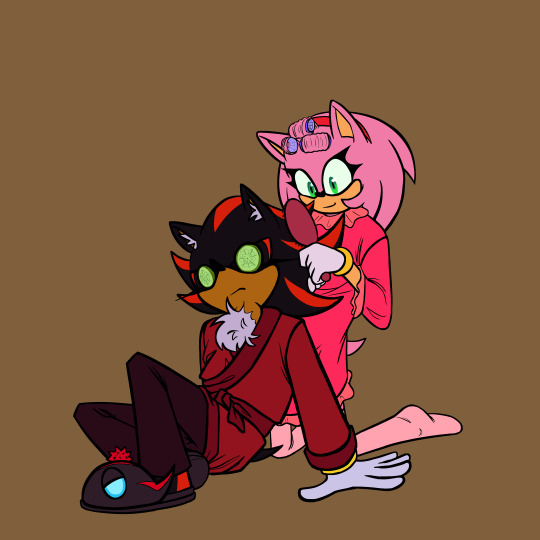
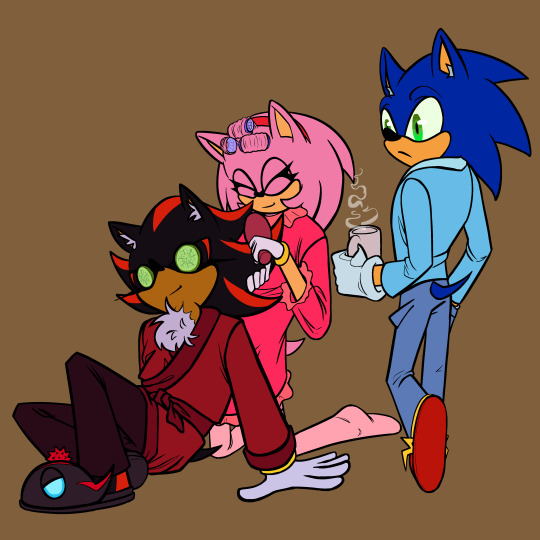

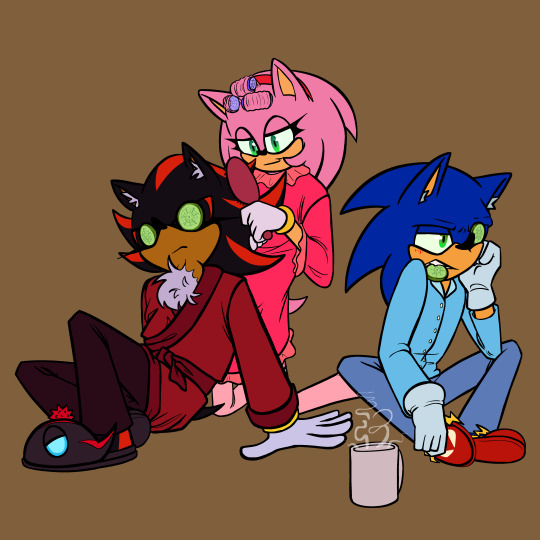
please don't look at me this is the first time I've been self indulgent about Sonic since I was a kid this is making me flustered hrhghhh Amy Rose nothing could ever make me hate you
#stoppp#i don't know why i'm so embarrassed over this#this is like the most normal thing ever#i just haven't been. i dunno. i haven't been in the fandom this seriously in like forever 😭#and last time i was in the fandom was. hm.#all my interactions with sonic fans up until the new sonic 3 movie have been less than ideal#so that's probably why this is flustering me so much. cause like now i've got the ability to be self indulgent#without being judged by my friends anyway#sonic the hedgehog#sth#sth Shadow#Shadow the Hedgehog#sth Amy#Amy Rose#Shadamy#Sonamy#it's not really s//onadow. not that i hate that ship it's just not my cup of tea yk#they're more of friends who will never admit that they're friends because ewww that's so embarrassing omggg#except for when sonic does so only in front of shadow because he knows it pisses him off. but he'd never ACTUALLY admit it. like wholeheart#ANYWAY ENOUGH RAMBLING IN THE TAGS#art#digital art#mini comic#jay draws#fanart#ship art#don't utter a word about proportions. like i said I HAVEN'T BEEN IN THIS FANDOM SINCE I WAS A KID. OKAY.
156 notes
·
View notes
Text

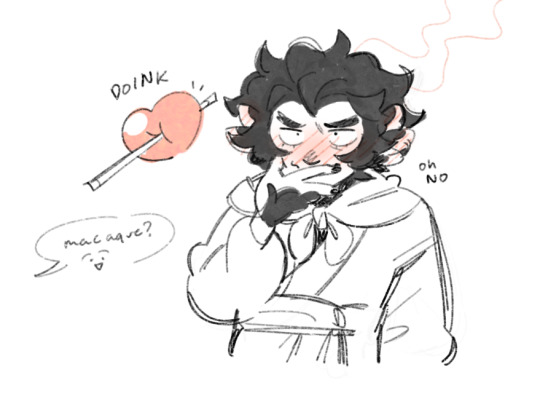
axolotl
#covers my face. this is dumb theyre dumb idk what was going thru my mind making this.h#i like this brush tho i think ill keep using it#i had this thought awhile ago that axolotls kind of remind me of macs ears. and i had a nice thought that if wukong ever saw one#he'd say the same thing. and thats why im sitting here with my head in my hands#macaque doesnt know if hes embarassed amused or straight up smitten. its all 3#i have such a hard time drawing necks and shoulders.. mac is supposed to kind of hunch up his shoulders#the way some ppl do when they bow their neck down kind oflike. defensive-tucking in position when theyre making themselves small#i cant really get it to look right so it kinda looks like his head is sunken too close to his shoulders. so i guess ill keep practising#maybe if i brought his head closer to the collarbone it will look better. but i struggle with foreshortening so theres a chance itll#just look like his neck starts at the collar. ughhh#god have mercy if i ever draw hugs. i hate positioning the shoulder i hate hate hate it. 10 dead 17 injured#i have new design note ideas for em but ill post another time#myart#doodles#lego monkie kid#lmk#monkie kid#shadowpeach#lmk sun wukong#lmk swk#lmk macaque#lmk six eared macaque#lmk liu er mihou
3K notes
·
View notes
Text
Félix: kidnapping is a love language Kagami: you have no social skills, idiot
*two weeks later*
Félix: okay, so when Marinette's at her most vulnerable, I'll gaslight her into thinking I'm her boyfriend, so she'll follow me into an abandoned building where we can put her in an altered mental state and present to her my family's life story in the imaginable most cryptic play of theater she has ever seen, which will reveal to her our horrible secret and the fact that her abusive father-in-law is also her arch-nemesis Kagami: you're so big brained, bae 🥰
#I LOVE THEM BUT GOD THAT WAS THE LEAST SELF-EXPLANATORY WAY TO GO ABOUT THIS#fucking theater kids /lh#miraculous ladybug#ml spoilers#ml representation#ml representation spoilers#maybe they do team up nicely with Marinette because can ever be simple sfdgdfhgjfhg#I'm so pumped for the final ohmygodddd#also did you know I wrote a story in highschool where the son of the villain revealed his family's true nature to the MC#in a cryptic fairy tale. where he assigned his father as the evil prince who moved into the king's family and married the pricess#who ended up comatose and waiting for revival?#the moral of the story is we're all insane here and I cannot believe I literally wrote 30k about this#and not have the gall to diss on feligami they are the MVPs fgdhjdfhgfjgk#also props for being so much more useful going about this whole thing than Luka <3
2K notes
·
View notes
Text
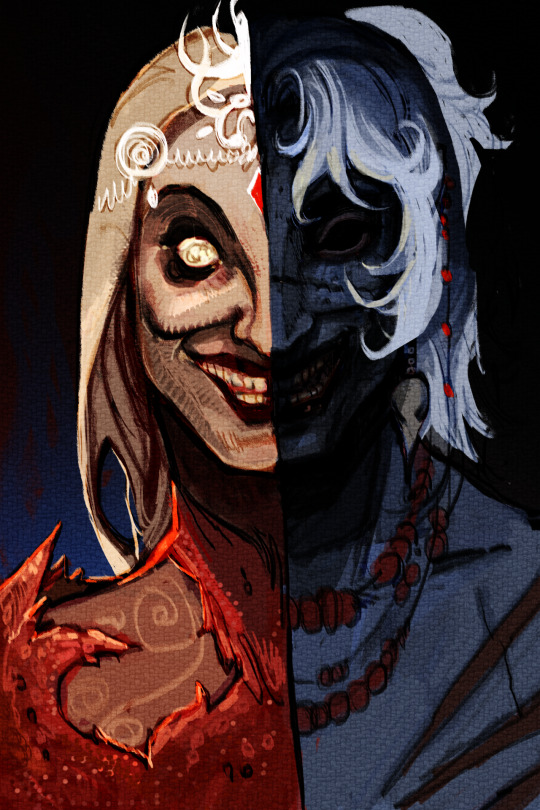
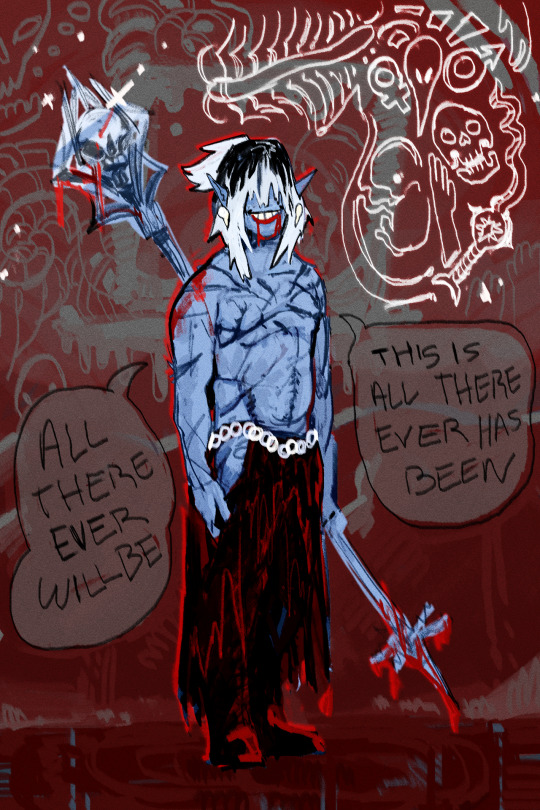
CHILDREN OF BHAAL
I adore the vibe of redeemed durge your sister killed your mind and took your place - it was the greatest gift she ever gave you
#orin the red#baldur's gate 3#bg3 orin#the dark urge#cant stop thinking about orin#myart#durge vaye#still deciding what kind of c section scar to give vaye#went with a vertical scar for this one#the lore for vaye is that he got pretty far into his life as baahls chosen as far as milestones are concerned#became unholy assassin almost finished those plans to take over the world had a kid for sacrifice/back up bhaalspawn purposes ect#& was daddy's perfect little murder baby <3 until the lobotomy ofc#then only with memory loss was there was enough distance for him to actually face how fucked the whole situation#btw Orin did Vaye's top surgery c-section and lobotomy <3#thats his whole medical team right there#when you wake up with no memory all you have is your body for evidence so i really leaned into that for vaye's scars#I gave him vash the stampede level scars lol#he wakes up knows 4 things: that hes been through metaphorical hell and survived that someone did a choppy job on his top surgery#that at one point he decided face + eye tattoos would be his thing and that hes had a child#Im debating whether or not Orin would outright kill the kid or if shed keep the kid around until theyre old enough to face her in a duel#Leaning towards the second#that means while vaye is wondering around faerun that kid is having arts and crafts time with auntie orin! (oh no oh no oh no)
272 notes
·
View notes
Text
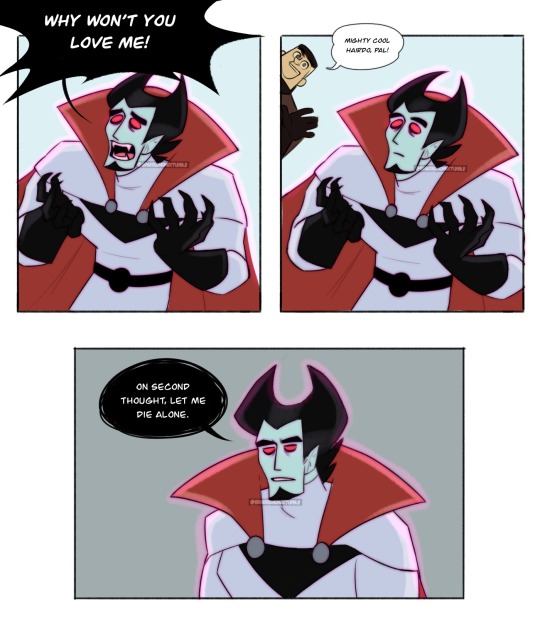
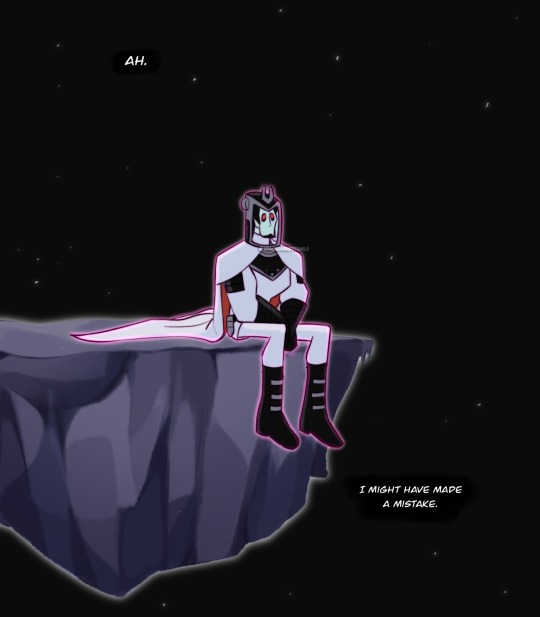
so this is basically the whole space trip thing right.
#danny phantom#danny phantom fanart#dp#dp fanart#vlad plasmius#jack fenton#vlad masters#i know a lot of people don't like what they did with... uh. season 3 in general#i'm kind of one of them? my feelings aren't suuuper strong but y'know def the weakest of the bunch#HOWEVER#aesthetic.#as a lover of all things space travel themed i approve his funny little space vampire outfit#i was disappointed when it was gone at the end of the episode lmao#why do i draw so much vlad.#... don't answer that. i get it. *squints at narry*#not that narry has beef with like. a teenager. but he does have beef with hundreds of internet reviewers on steam#ONE of em has got to be a kid. at least.#ney's art#ney's comics#this is not a part of the eight page comic i'm making btw. i am simply hopping from canvas to canvas. again.
888 notes
·
View notes
Text



scrapbook practice with keeran
#with implications of javieran because … of course#this was … SO fun. honestly.#i’d never done anything like this before but have always wanted to give it a try#it’s a mess and i’m awful at composition but oh man it was so fun#i’ve been having so much fun just trying to create like a kid again#like i’ll think “i want to do this thing’’ and i’ll let myself do it even if it’ll be a bit bad#it’s freeing :] i recommend everyone try it immediately#creating just because … like i’m a kid again … sighs ….#anyway i love them god javieran plagues me it’s all i can make#the kieran study itself is kinda meh cuz i never study him so i struggle to actually capture his likeness but it was still really fun :3#i hope i can do stuff like this more !!!! i want to get better at scrapbooking#rdr2#red dead redemption 2#image#kieran duffy#javier escuella#implied LOL#javieran#art#hero draws sometimes
62 notes
·
View notes
Text
Luo Binghe is the kinda psychopath to pull out scrabble on a date and call it flirting and Shen Yuan is able to respond positively to this because man has zero, negative, and infinity levels of rizz catching all and simultaneously no bitches at once because these radio frequencies are all different lengths in this essay I will...
#svsss#svsss shitpost#shen yuan#shen qingqiu#sqq#luo binghe#bingqiu#scum villain self saving system#SY would unironically thing LBH's scrabble skills are impressive and hot#it's not even LBH spelling out the spicy words#its 'OOH 3 words in and already using 12 letters? in one word?! bold sexy astute'#'a Q? how debonair'#they're made for each other#not because any sort of soulmate nonsense but because they're both right type of freak to respond well to that#imagine being taken in by the intellectual prowess of another man's scrabble skill because youre that much of a prick and a know it all#SY is simultaneously a good and terrible person#truly a redditor#meanwhile LBH is someone who never made a friend in 12 + years of schooling and simultaneously is extremely popular#equally freak behavior#both does and doesnt have a hobby#would be an incel if he didnt choose his target and won't let go#kids these freaks are professionals#do not repeat#not even getting into how SY is both pulling not with mulitple people constantly and its like you think how is this man single?#and yet is not how#its where and when but also why
80 notes
·
View notes